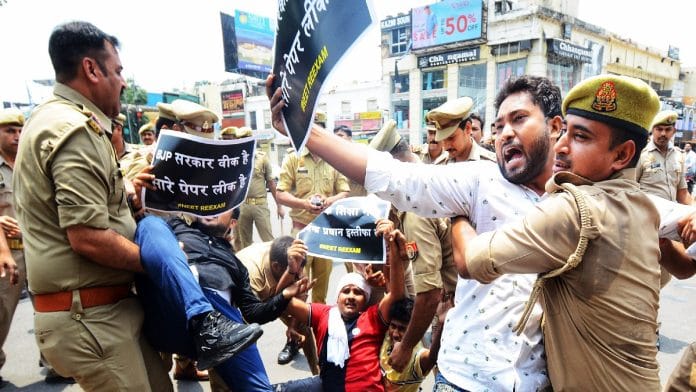Lucknow: Facing public anger due to rampant paper leaks, which has been seen as one of the reasons for the BJP’s poor electoral performance in Uttar Pradesh, the Yogi Adityanath government has issued a slew of guidelines for bodies conducting exams. It has also instructed the state director general of police (DGP) and UP Police Special Task Force (STF) to enhance security measures at exam centres.
The guidelines were issued by Additional Chief Secretary (Appointment and Personnel) Devesh Chaturvedi Wednesday to the UP Public Service Commission, UP Subordinate Services Selection Commission (UPSSSC), UP Police Recruitment and Promotion Board, UP Electricity Service Commission, UP Education Service Selection Board, UP Cooperative Institutional Service Board, UP Power Corporation Limited, additional chief secretaries/principal secretaries for home, higher education, electricity, cooperative, technical education among others.
The guidelines include a slew of directives for the process of selection of exam centres, selection of agencies for preparing question papers, getting them printed, transporting OMR sheets to the respective commission/board, security of exam centres, for OMR scanning, steps to be taken during exams, steps to be taken to stop impersonation, etc.
They also mention that the district-level committee tasked with the selection of exam centres has been reconstituted. Headed by district magistrates, these committees will include the senior superintendent of police or superintendent of police, additional DM or nodal officer (examination), the district-level officer of the National Informatics Centre, higher education/technical education officer and the district inspector of schools (DIOS) as its members.
Also Read: NTA was supposed to rescue exams from ‘Munna Bhais’. Now it’s part of the problem
Two categories of exam centres
The guidelines stipulate that only two categories of exam centres will be considered for conduct of exams.
Category ‘A’ refers to ‘government intermediate schools with all required facilities, government degree colleges, central government universities, polytechnic state government engineering colleges, state medical colleges, etc.’.
Category ‘B’ refers to ‘reputed and aided educational institutions laced with facilities which have not been in the list of suspicious or controversial institutes or those blacklisted’.
A detailed set of criteria has been defined for the selection of exam centres. For instance, the the centre should be within a distance of 10 km from the bus stand/railway station, should have seating capacity to accommodate all candidates, availability of teachers/personnel for room inspection, at least three years’ prior experience of conducting exams, be within city limits, be well-connected by road, have a boundary wall, toilet, drinking water, functional CCTVs etc.
Mandatory LIU report before finalising exam centres
The guidelines further mandate that the final list of exam centres should be prepared only after taking a report from the Local Intelligence Unit (LIU) mandatorily and separate agencies be chosen for tasks like preparing/printing question papers and transporting them to the treasuries in all districts, transporting question papers from treasuries to exam centres and transporting OMR sheets to commission/board, for security arrangements at exam centres like frisking, biometric, CCTVs and scanning of OMR sheets.
On the preparation of question papers, the guidelines say that there should be at least two or more sets of question papers so that they can be used if required. Moreover, separate agencies should prepare separate sets of question papers and the decision to use a particular question paper should be taken only five hours before the exam.
They further stipulate that candidates seated next to each other should get papers of different series and that question papers be transported in a box made of tamper-proof material.
“Each set should have multiple series of question papers with questions coming at different sequence in each of the series so that chances of cheating can be less. The options for each question should also be jumbled in each of the series,” reads the order mentioning the guidelines, a copy of which ThePrint has accessed.
They further stipulate that candidates seated next to each other should get paper of different series and that question papers be transported in a box made of tamper proof material.
The guidelines also mandate that three copies of OMR sheets need to be maintained including one for the exam conducting board/commission, one to be kept in the secret state treasury and one be given to the candidate. The scoring process of the OMR sheet should also be fully automated.
To check impersonation
Under the section about impersonation, the guidelines stipulate that identity cards of candidates and admit cards be checked not only at the main gate but also inside the exam centres.
“CCTV cameras installed at exam centres should cover the entire room and its footage be saved by the commission/board after the examination. Aadhaar cards and biometric data of suspicious candidates be matched during the exam at the exam centres itself,” note the guidelines.
They add that suspicious persons should be identified during the examination “using Artificial Intelligence”.
They further state that disabled candidates and women should not be allocated exam centres outside their home districts.
The UP government order also calls for random allocation of exam centres, and that invigilators be allotted exam centres just 30 minutes before the exam on a random basis.
Candidates’ signatures as witnesses before opening question papers
The guidelines further mention that question papers and OMR sheets be opened before a static magistrate or a centre supervisor 45 minutes before the exam and the act should be video recorded. Moreover, the signatures of at least two candidates should be obtained as witnesses while opening the question papers and OMR sheets.
They also state that CCTV footage of the question papers being kept in the treasury and removed on the date of the exam should be preserved. Moreover, candidates and personnel deployed at exam centres should be frisked, the guidelines state, and there should be a full ban on bringing any kind of electronic devices into the exam centre.
(Edited by Gitanjali Das)
Also Read: Great Indian exam scandal: NEET, UGC-NET & now CSIR-UGC NET, frustrated students say NTA ‘incapable’






